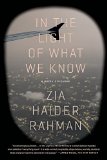Summary | Excerpt | Reviews | Beyond the Book | Readalikes | Genres & Themes | Author Bio

My own father had encouraged in me a sympathy toward the numinous claims of faith without ever surrendering the authority of science. He is a Muslim, my father; not a zealot but a quiet believer. He has always attended Friday prayers, which to him serve a social function, helping him to retain a link with his roots. While some connections gave in to the attrition of time and distance, others he deliberately let go because, as he explained, he was keen to see his son set his feet in the West. Apart from the Friday ritual, my father does not pray, not even once a day, let alone the five times ordained by Sunni Islam. He has never worn a skullcap, my father, and has never shown a drop of guilt for drinking alcohol. He drinks only on occasion, "certainly at christenings and bar mitzvahs," he likes to say. "Oh, look," he will remark, as he takes a bottle of fifteen-year-old single malt from the cabinet, "this whisky has certainly come of age. Let us baptize it in the name of the father and the son."
Despite these impieties, which, it is fair to say, stand in the lee of a great Pakistani tradition, going back even to the country's founder, Jinnah, who was known to be rather partial to whisky, my father described himself then and does so now as a follower of the faith. When I once asked him how a physicist could believe in God, his answer was that physics did not explain everything and it did not answer the question, Why these laws and not others? For him, it was not enough to regard the world as being simply as it is. I would have to decide, he told me, whether science was enough for me.
My mother, on the other hand, had only disdain for religion. Islam, she said, oppressed women and encouraged people to accept their abysmal lot in this world in exchange for the promise of some fanciful happily ever afterlife. Not for her such opiates.
Zafar's mother interested me more than his father did. As I write this, I remember an intriguing article, which I came across in a journal in my parents' home and which is now easily obtainable on the Internet. The article, written by the primatologist Frans de Waal, concerns his studies of kinship recognition among chimpanzees. De Waal and his colleague Lisa Parr, the article stated, presented their subject chimpanzees with the task of matching digitized portraits of unfamiliar female chimpanzees with portraits of their offspring. Astonishingly, they found that chimpanzees could match the faces of mothers and sons, thereby establishing kin recognition independent of previous experience with the individuals in question.
Had I been set the same task, I'm quite sure I would have failed to match Zafar to his mother, for I saw no resemblance between them. In his father's aspect, a softness of the eyes, a roundness of face, and a tilting of the head—all of these I recognized in Zafar. But his mother seemed entirely alien to my friend, her eyes sharp and determined, the face long and thin, and the mouth tense.
When we encounter a face, we view it as a whole, by a process of integration of the parts, which takes place, as some scientists and physicians understand it, in the optic nerves long before any transmission reaches the brain. The otherwise dizzying abundance of information that hits the retina is distilled in this tract of fibers behind the eye into a sign that our intelligence can absorb. When we see a strip of letters, a billboard slogan, for example, we cannot help but read the word; we do not see each letter separately, but rather, instantly, we grasp the whole word and, moreover, its meaning. As I stood there, on that June morning in Oxford, my friend's mother's face offered no sign of resemblance to Zafar, as if their respective faces were words written in different languages.
My lasting regret is that I made my excuses and did not go with them to Headington for breakfast. At the time, and immediately afterward, I told myself that I had sensed that in his heart my friend did not want me to. But the truth is that I myself, to my own shame, felt embarrassed for my friend. Sharper still was the disconcerting feeling I had in those few minutes that a distance had opened up between him and me for reasons I did not grasp in their full subtleties. After that day, Zafar did not mention his parents again. If friendship has a cost, then perhaps it is that at its heart there is always a burden of guilt. I don't deny that I've failed to do certain things, failed, for instance, to provide support in the hour of need, or step in when that's what a friend should do, failed as a friend. But my regrets for the things I did not do pale against the guilt I bear for an act of commission and its consequences.
Excerpted from In the Light of What We Know by Zia Haider Rahman. Copyright © 2014 by Zia Haider Rahman. Excerpted by permission of Farrar, Straus & Giroux. All rights reserved. No part of this excerpt may be reproduced or reprinted without permission in writing from the publisher.
Your guide toexceptional books
BookBrowse seeks out and recommends the best in contemporary fiction and nonfiction—books that not only engage and entertain but also deepen our understanding of ourselves and the world around us.